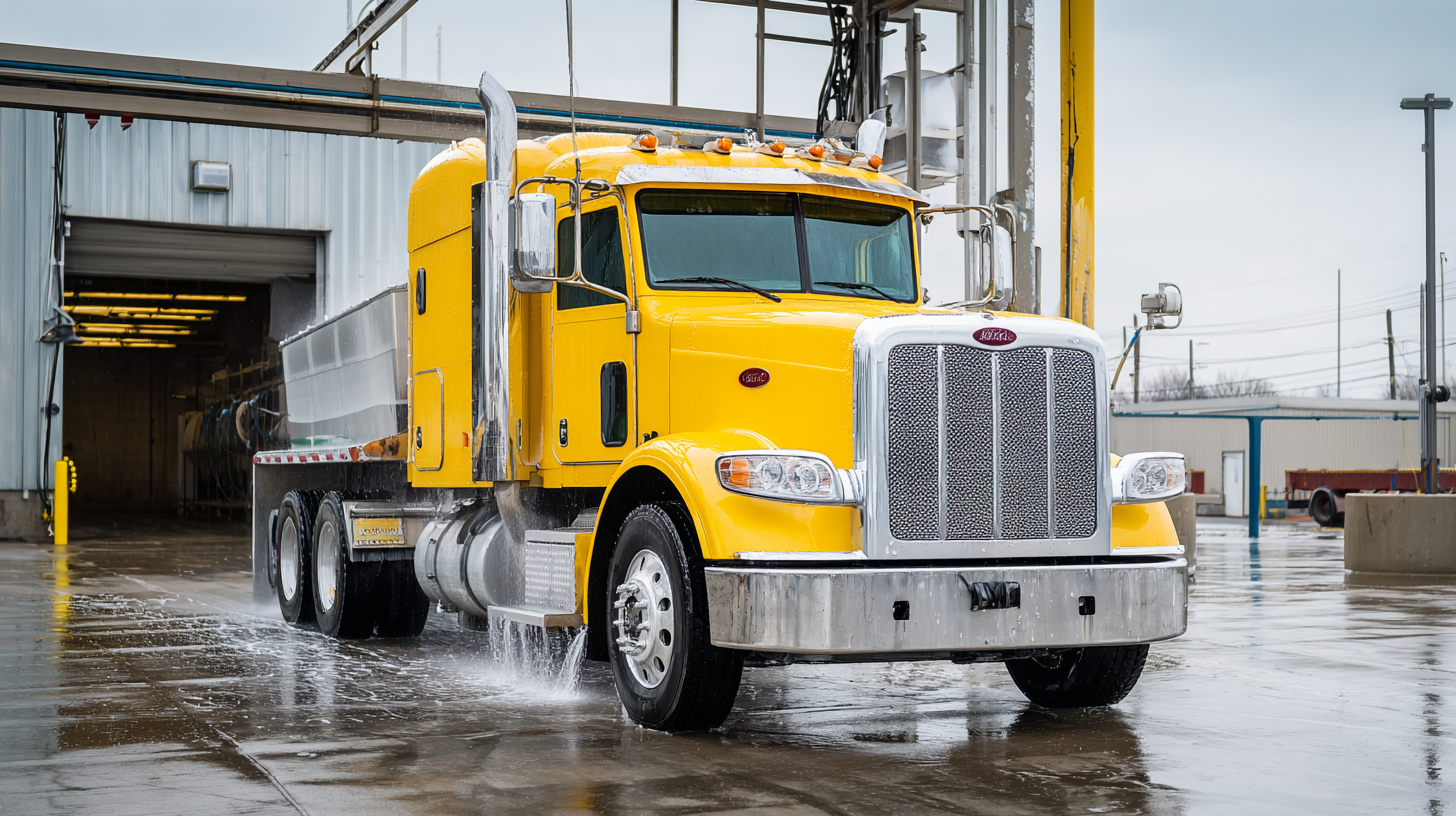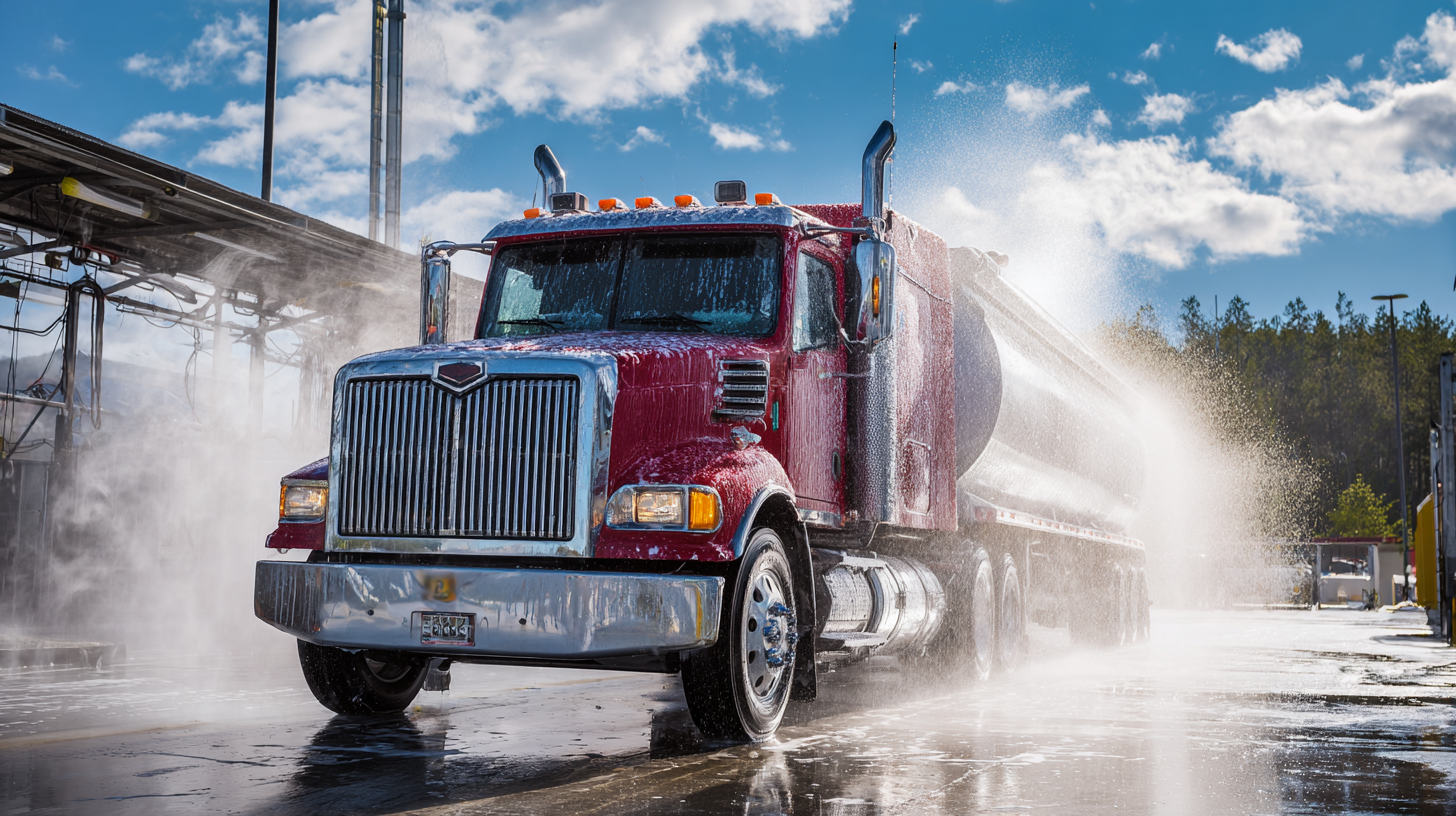Mastering the Art of Efficient Truck Maintenance: A Complete Guide to the Best Automatic Semi Truck Wash Solutions
The efficiency of truck maintenance is crucial in the transportation industry, where cost-effectiveness and reliability can significantly impact a company's bottom line. According to a recent report by the American Transportation Research Institute, nearly 65% of trucking companies recognize that improper maintenance practices lead to reduced vehicle lifespan and increased operational costs.

Among essential maintenance practices, regular cleaning is often overlooked, yet it plays a vital role in vehicle upkeep. Automatic Semi Truck Wash solutions have emerged as a game-changer, providing comprehensive cleaning that not only enhances the aesthetic appeal of trucks but also extends their service life.
By leveraging advanced technologies and automated systems, these wash solutions can reduce labor costs and improve wash efficiency, making them an invaluable asset for fleet operators aiming for operational excellence.
Understanding Industry Production Standards for Truck Maintenance
In the fast-evolving logistics industry, understanding production standards for truck maintenance is crucial for ensuring operational efficiency and longevity of vehicles. The 2023 logistics maintenance festival highlighted that the lifecycle service of freight vehicles encapsulates a significant market demand for purchasing, usage, and maintenance. As companies strive to enhance their competitive edge, adopting industry-specific criteria in truck maintenance practices becomes essential.
An integral aspect of efficient truck maintenance is the implementation of automatic semi truck wash solutions. These systems not only save time but also ensure that trucks remain in optimal condition, minimizing wear and tear. By adhering to established industry standards, companies can streamline their maintenance processes, reduce downtime, and ultimately enhance the reliability of their fleets. Such initiatives are vital in fostering a sustainable logistics environment and meeting the increasing demands of the market.
The Role of Automatic Semi Truck Wash Solutions in Fleet Management
In the realm of fleet management, maintaining a clean fleet isn’t merely about aesthetics; it's a critical component of operational efficiency. According to a report by the American Trucking Associations, maintaining a well-kept fleet can improve fuel efficiency by up to 10%. Automatic semi truck wash solutions play a vital role in this aspect, ensuring that vehicles are cleaned efficiently and consistently without compromising on quality. Furthermore, vehicles that regularly undergo thorough cleaning are less susceptible to corrosion and damage, which can lead to increased maintenance costs over time.
Tips: Implement a routine washing schedule for your fleet to prevent the buildup of dirt and grime. Utilizing an automatic wash solution can save time and labor costs, allowing your team to focus on other essential tasks within the fleet management process. Another effective approach is to choose eco-friendly wash solutions that not only clean but also protect the truck's exterior, ensuring a longer lifespan for your assets.
Investing in automatic semi truck washes can significantly reduce downtime and enhance your fleet's overall performance. A recent study showed that fleets using automated washing solutions experienced a reduction in maintenance-related issues by over 15%. Thus, integrating these solutions into your fleet management strategy not only improves the appearance of your trucks but also optimizes their operational readiness.
Best Practices for Maintaining Fleet Efficiency through Regular Washes
Regular washing of semi trucks plays a pivotal role in maintaining fleet efficiency and optimizing operational costs. Over time, dirt, grime, and road salt accumulate on vehicles, leading to potential rust and corrosion. This buildup not only impacts the aesthetics of the trucks but also affects their performance and longevity. By incorporating a routine washing schedule, fleet managers can ensure that their trucks remain in peak condition, thereby reducing the need for costly repairs and downtime.

Utilizing automatic semi truck wash solutions can significantly streamline the maintenance process. These systems offer a quick and thorough cleaning, allowing trucks to get back on the road faster without compromising on quality. Moreover, frequent washes improve visibility for drivers and enhance the overall safety of the fleet.
Implementing these best practices ensures that fleets operate efficiently, with reduced risks and increased productivity. Prioritizing regular washes translates to a more reliable, durable, and visually appealing fleet that upholds the company’s image and operational standards.
Comparative Analysis of Top Automatic Truck Wash Systems on the Market
When it comes to maintaining the efficiency and appearance of semi trucks, the choice of an automatic truck wash system plays a pivotal role. Recent industry reports indicate that a well-maintained truck can lead to fuel savings of up to 10%, significantly enhancing a fleet's overall operational efficiency. Automatic truck wash systems offer not only the convenience of quick service but also the ability to provide consistent cleaning that adheres to the standards set by fleet management benchmarks.
In a comparative analysis of the top automatic truck wash systems available today, key contenders such as the driverless OctoWash and the high-pressure CleanFleet stand out. The OctoWash boasts a 15-minute wash cycle time, ideal for busy logistics hubs, while CleanFleet offers advanced eco-friendly cleaning solutions that utilize up to 90% less water compared to traditional methods. Reports suggest that fleets utilizing automatic systems experience an average increase in productivity by 25%, a compelling argument for decision-makers seeking to invest in these technologies. Understanding the differences and efficiencies offered by these systems is crucial for operations aiming for sustainability and cost-effectiveness.
Mastering the Art of Efficient Truck Maintenance: A Complete Guide to the Best Automatic Semi Truck Wash Solutions
| Wash System Type | Cleaning Method | Cycle Time (minutes) | Water Consumption (gallons) | Estimated Cost ($) | User Rating (out of 5) |
|---|---|---|---|---|---|
| Touchless Wash | High-pressure water jets | 15 | 50 | 25,000 | 4.2 |
| Bucket Wash | Brushes and detergent | 20 | 75 | 20,000 | 4.5 |
| Roll-Over Wash | Automated overhead wash | 10 | 40 | 30,000 | 4.0 |
| Inline Wash | Combination of methods | 12 | 60 | 35,000 | 4.8 |
Implementing an Effective Maintenance Schedule with Automatic Wash Solutions
Implementing an effective maintenance schedule for semi trucks is crucial for maximizing operational efficiency and longevity. According to a recent report from the American Trucking Research Institute, well-maintained trucks can reduce overall costs by up to 10%. Incorporating automatic wash solutions into your maintenance regimen not only keeps your fleet looking professional but also plays a significant role in prolonging the life of critical components. Regular cleaning removes corrosive substances such as road salts and grime that can lead to rust and mechanical failures.

One of the best practices for integrating automatic wash solutions into your maintenance schedule is to establish a routine washing timetable. Ideally, a wash should occur every two weeks, especially in regions where trucks are frequently exposed to harsh weather conditions. This consistency not only enhances the truck's appearance but also ensures that dirt and debris do not accumulate and cause damage over time.
Tip 1: Collaborate with wash service providers that offer tailored packages designed specifically for commercial fleets, which can save both time and costs.
Tip 2: Monitor the effectiveness of your maintenance schedule by tracking vehicle performance and service intervals; a decline in performance can signal a need to adjust your washing frequency.
With these strategies, trucking companies can maintain a rigorous yet efficient maintenance program that leads to reduced downtime and improved operational productivity.